Applying Competing Values Framework to Leadership in Tourism
VerifiedAdded on 2023/03/30
|6
|1577
|160
Report
AI Summary
This report provides an analysis of leadership skills using the Competing Values Framework (CVF). It assesses the manager's competencies, highlighting areas of improvement and strengths. The analysis includes a comparison of past and present performance, focusing on roles such as facilitator, producer, innovator, director, coordinator, and monitor. The report emphasizes the importance of flexibility and innovation in today's dynamic tourism industry, noting that while the manager has improved in areas like mentoring and motivating staff, there is a need to embrace new ideas and strategies. The report concludes that continuous self-appraisal and adaptation are crucial for success in leadership roles, especially in people-oriented industries like tourism. Desklib provides this document as part of its collection of solved assignments and study resources for students.
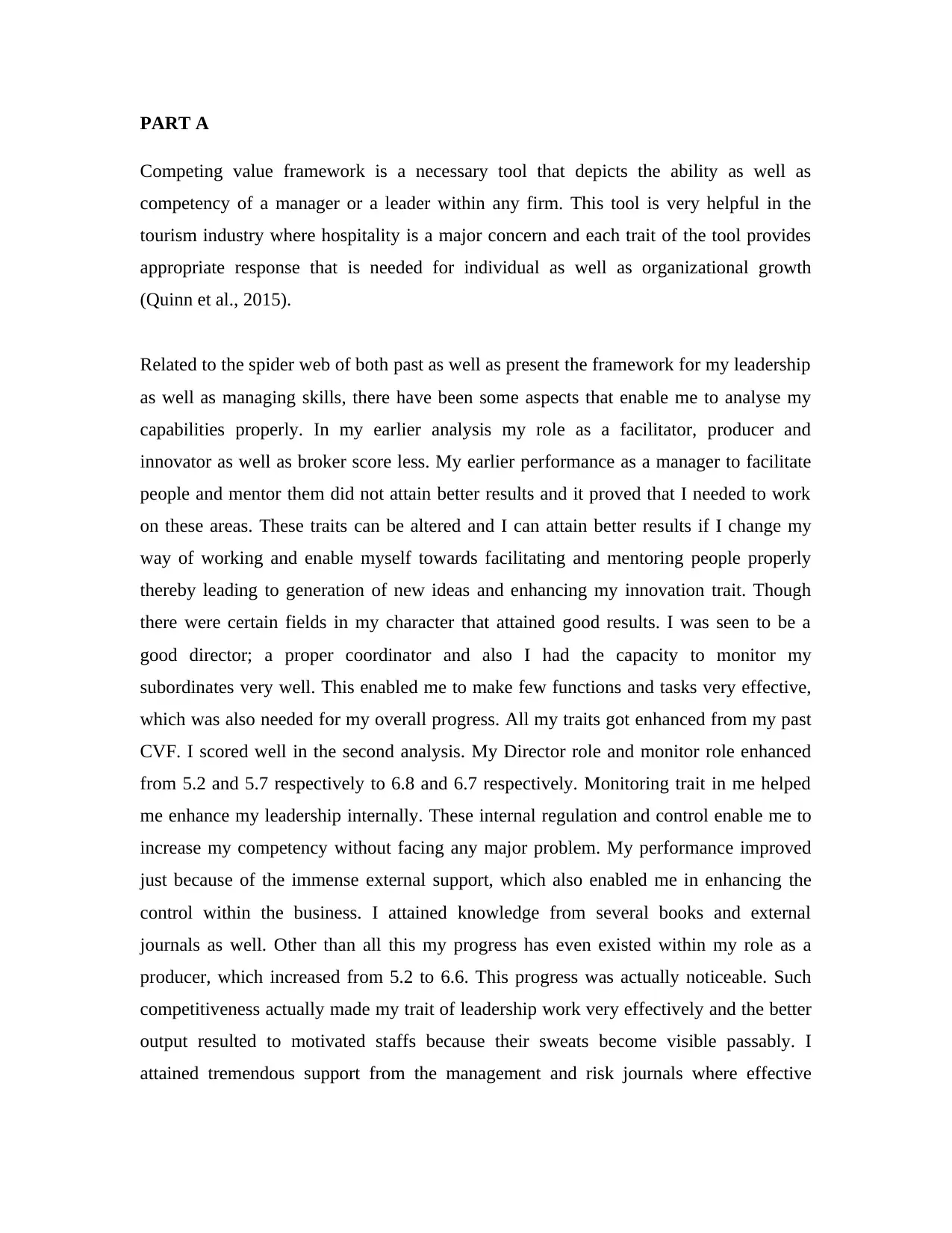
PART A
Competing value framework is a necessary tool that depicts the ability as well as
competency of a manager or a leader within any firm. This tool is very helpful in the
tourism industry where hospitality is a major concern and each trait of the tool provides
appropriate response that is needed for individual as well as organizational growth
(Quinn et al., 2015).
Related to the spider web of both past as well as present the framework for my leadership
as well as managing skills, there have been some aspects that enable me to analyse my
capabilities properly. In my earlier analysis my role as a facilitator, producer and
innovator as well as broker score less. My earlier performance as a manager to facilitate
people and mentor them did not attain better results and it proved that I needed to work
on these areas. These traits can be altered and I can attain better results if I change my
way of working and enable myself towards facilitating and mentoring people properly
thereby leading to generation of new ideas and enhancing my innovation trait. Though
there were certain fields in my character that attained good results. I was seen to be a
good director; a proper coordinator and also I had the capacity to monitor my
subordinates very well. This enabled me to make few functions and tasks very effective,
which was also needed for my overall progress. All my traits got enhanced from my past
CVF. I scored well in the second analysis. My Director role and monitor role enhanced
from 5.2 and 5.7 respectively to 6.8 and 6.7 respectively. Monitoring trait in me helped
me enhance my leadership internally. These internal regulation and control enable me to
increase my competency without facing any major problem. My performance improved
just because of the immense external support, which also enabled me in enhancing the
control within the business. I attained knowledge from several books and external
journals as well. Other than all this my progress has even existed within my role as a
producer, which increased from 5.2 to 6.6. This progress was actually noticeable. Such
competitiveness actually made my trait of leadership work very effectively and the better
output resulted to motivated staffs because their sweats become visible passably. I
attained tremendous support from the management and risk journals where effective
Competing value framework is a necessary tool that depicts the ability as well as
competency of a manager or a leader within any firm. This tool is very helpful in the
tourism industry where hospitality is a major concern and each trait of the tool provides
appropriate response that is needed for individual as well as organizational growth
(Quinn et al., 2015).
Related to the spider web of both past as well as present the framework for my leadership
as well as managing skills, there have been some aspects that enable me to analyse my
capabilities properly. In my earlier analysis my role as a facilitator, producer and
innovator as well as broker score less. My earlier performance as a manager to facilitate
people and mentor them did not attain better results and it proved that I needed to work
on these areas. These traits can be altered and I can attain better results if I change my
way of working and enable myself towards facilitating and mentoring people properly
thereby leading to generation of new ideas and enhancing my innovation trait. Though
there were certain fields in my character that attained good results. I was seen to be a
good director; a proper coordinator and also I had the capacity to monitor my
subordinates very well. This enabled me to make few functions and tasks very effective,
which was also needed for my overall progress. All my traits got enhanced from my past
CVF. I scored well in the second analysis. My Director role and monitor role enhanced
from 5.2 and 5.7 respectively to 6.8 and 6.7 respectively. Monitoring trait in me helped
me enhance my leadership internally. These internal regulation and control enable me to
increase my competency without facing any major problem. My performance improved
just because of the immense external support, which also enabled me in enhancing the
control within the business. I attained knowledge from several books and external
journals as well. Other than all this my progress has even existed within my role as a
producer, which increased from 5.2 to 6.6. This progress was actually noticeable. Such
competitiveness actually made my trait of leadership work very effectively and the better
output resulted to motivated staffs because their sweats become visible passably. I
attained tremendous support from the management and risk journals where effective
Paraphrase This Document
Need a fresh take? Get an instant paraphrase of this document with our AI Paraphraser
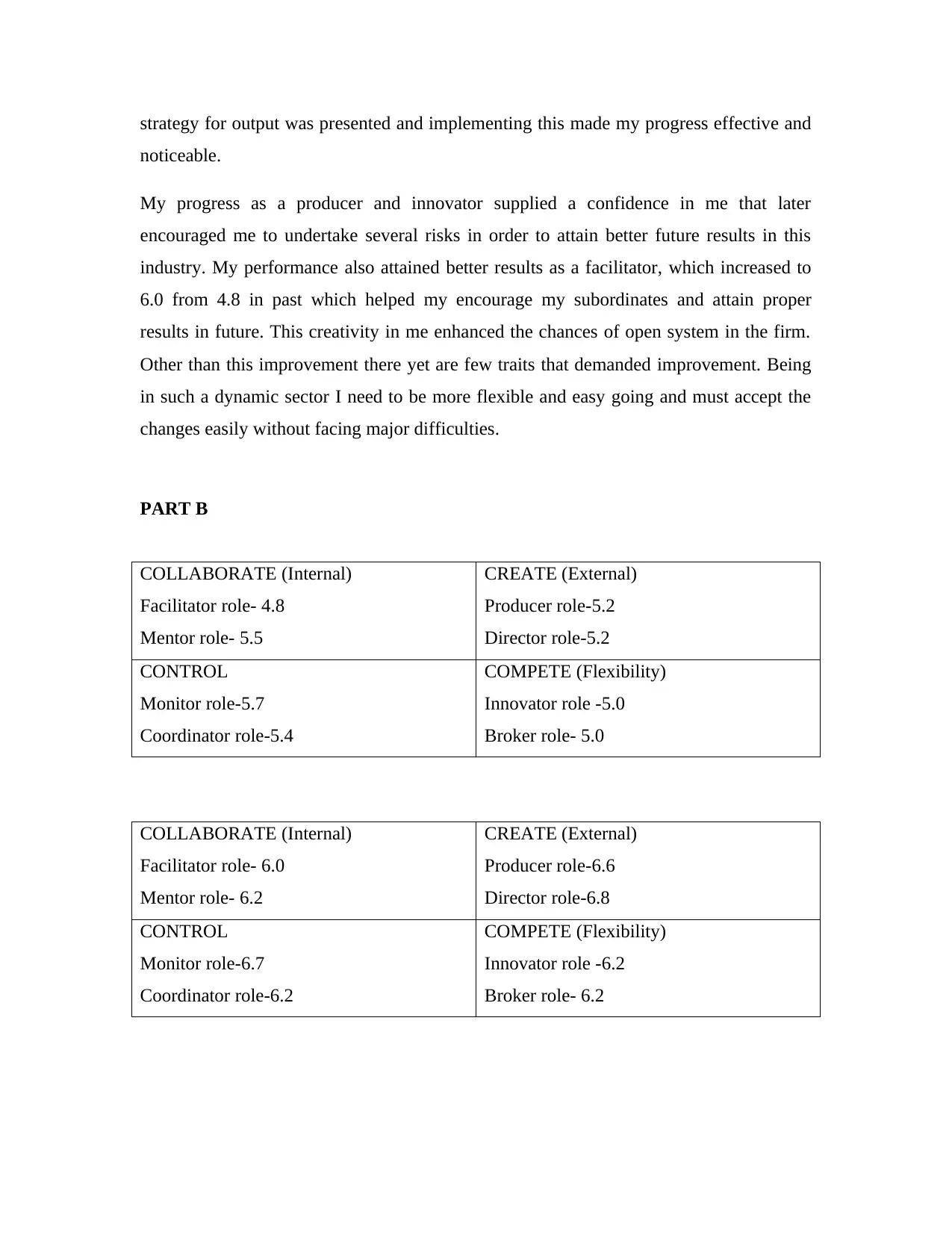
strategy for output was presented and implementing this made my progress effective and
noticeable.
My progress as a producer and innovator supplied a confidence in me that later
encouraged me to undertake several risks in order to attain better future results in this
industry. My performance also attained better results as a facilitator, which increased to
6.0 from 4.8 in past which helped my encourage my subordinates and attain proper
results in future. This creativity in me enhanced the chances of open system in the firm.
Other than this improvement there yet are few traits that demanded improvement. Being
in such a dynamic sector I need to be more flexible and easy going and must accept the
changes easily without facing major difficulties.
PART B
COLLABORATE (Internal)
Facilitator role- 4.8
Mentor role- 5.5
CREATE (External)
Producer role-5.2
Director role-5.2
CONTROL
Monitor role-5.7
Coordinator role-5.4
COMPETE (Flexibility)
Innovator role -5.0
Broker role- 5.0
COLLABORATE (Internal)
Facilitator role- 6.0
Mentor role- 6.2
CREATE (External)
Producer role-6.6
Director role-6.8
CONTROL
Monitor role-6.7
Coordinator role-6.2
COMPETE (Flexibility)
Innovator role -6.2
Broker role- 6.2
noticeable.
My progress as a producer and innovator supplied a confidence in me that later
encouraged me to undertake several risks in order to attain better future results in this
industry. My performance also attained better results as a facilitator, which increased to
6.0 from 4.8 in past which helped my encourage my subordinates and attain proper
results in future. This creativity in me enhanced the chances of open system in the firm.
Other than this improvement there yet are few traits that demanded improvement. Being
in such a dynamic sector I need to be more flexible and easy going and must accept the
changes easily without facing major difficulties.
PART B
COLLABORATE (Internal)
Facilitator role- 4.8
Mentor role- 5.5
CREATE (External)
Producer role-5.2
Director role-5.2
CONTROL
Monitor role-5.7
Coordinator role-5.4
COMPETE (Flexibility)
Innovator role -5.0
Broker role- 5.0
COLLABORATE (Internal)
Facilitator role- 6.0
Mentor role- 6.2
CREATE (External)
Producer role-6.6
Director role-6.8
CONTROL
Monitor role-6.7
Coordinator role-6.2
COMPETE (Flexibility)
Innovator role -6.2
Broker role- 6.2
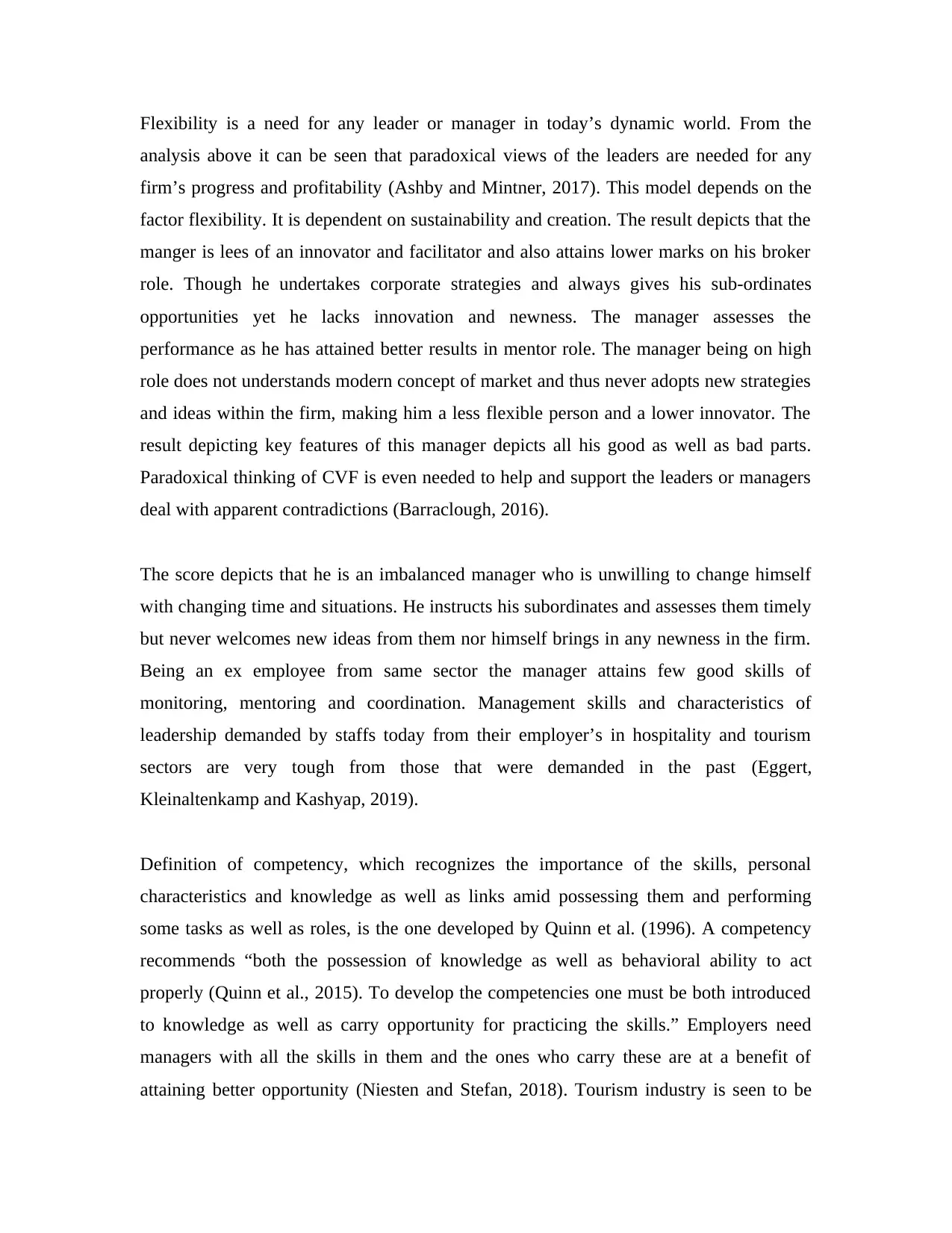
Flexibility is a need for any leader or manager in today’s dynamic world. From the
analysis above it can be seen that paradoxical views of the leaders are needed for any
firm’s progress and profitability (Ashby and Mintner, 2017). This model depends on the
factor flexibility. It is dependent on sustainability and creation. The result depicts that the
manger is lees of an innovator and facilitator and also attains lower marks on his broker
role. Though he undertakes corporate strategies and always gives his sub-ordinates
opportunities yet he lacks innovation and newness. The manager assesses the
performance as he has attained better results in mentor role. The manager being on high
role does not understands modern concept of market and thus never adopts new strategies
and ideas within the firm, making him a less flexible person and a lower innovator. The
result depicting key features of this manager depicts all his good as well as bad parts.
Paradoxical thinking of CVF is even needed to help and support the leaders or managers
deal with apparent contradictions (Barraclough, 2016).
The score depicts that he is an imbalanced manager who is unwilling to change himself
with changing time and situations. He instructs his subordinates and assesses them timely
but never welcomes new ideas from them nor himself brings in any newness in the firm.
Being an ex employee from same sector the manager attains few good skills of
monitoring, mentoring and coordination. Management skills and characteristics of
leadership demanded by staffs today from their employer’s in hospitality and tourism
sectors are very tough from those that were demanded in the past (Eggert,
Kleinaltenkamp and Kashyap, 2019).
Definition of competency, which recognizes the importance of the skills, personal
characteristics and knowledge as well as links amid possessing them and performing
some tasks as well as roles, is the one developed by Quinn et al. (1996). A competency
recommends “both the possession of knowledge as well as behavioral ability to act
properly (Quinn et al., 2015). To develop the competencies one must be both introduced
to knowledge as well as carry opportunity for practicing the skills.” Employers need
managers with all the skills in them and the ones who carry these are at a benefit of
attaining better opportunity (Niesten and Stefan, 2018). Tourism industry is seen to be
analysis above it can be seen that paradoxical views of the leaders are needed for any
firm’s progress and profitability (Ashby and Mintner, 2017). This model depends on the
factor flexibility. It is dependent on sustainability and creation. The result depicts that the
manger is lees of an innovator and facilitator and also attains lower marks on his broker
role. Though he undertakes corporate strategies and always gives his sub-ordinates
opportunities yet he lacks innovation and newness. The manager assesses the
performance as he has attained better results in mentor role. The manager being on high
role does not understands modern concept of market and thus never adopts new strategies
and ideas within the firm, making him a less flexible person and a lower innovator. The
result depicting key features of this manager depicts all his good as well as bad parts.
Paradoxical thinking of CVF is even needed to help and support the leaders or managers
deal with apparent contradictions (Barraclough, 2016).
The score depicts that he is an imbalanced manager who is unwilling to change himself
with changing time and situations. He instructs his subordinates and assesses them timely
but never welcomes new ideas from them nor himself brings in any newness in the firm.
Being an ex employee from same sector the manager attains few good skills of
monitoring, mentoring and coordination. Management skills and characteristics of
leadership demanded by staffs today from their employer’s in hospitality and tourism
sectors are very tough from those that were demanded in the past (Eggert,
Kleinaltenkamp and Kashyap, 2019).
Definition of competency, which recognizes the importance of the skills, personal
characteristics and knowledge as well as links amid possessing them and performing
some tasks as well as roles, is the one developed by Quinn et al. (1996). A competency
recommends “both the possession of knowledge as well as behavioral ability to act
properly (Quinn et al., 2015). To develop the competencies one must be both introduced
to knowledge as well as carry opportunity for practicing the skills.” Employers need
managers with all the skills in them and the ones who carry these are at a benefit of
attaining better opportunity (Niesten and Stefan, 2018). Tourism industry is seen to be
⊘ This is a preview!⊘
Do you want full access?
Subscribe today to unlock all pages.

Trusted by 1+ million students worldwide
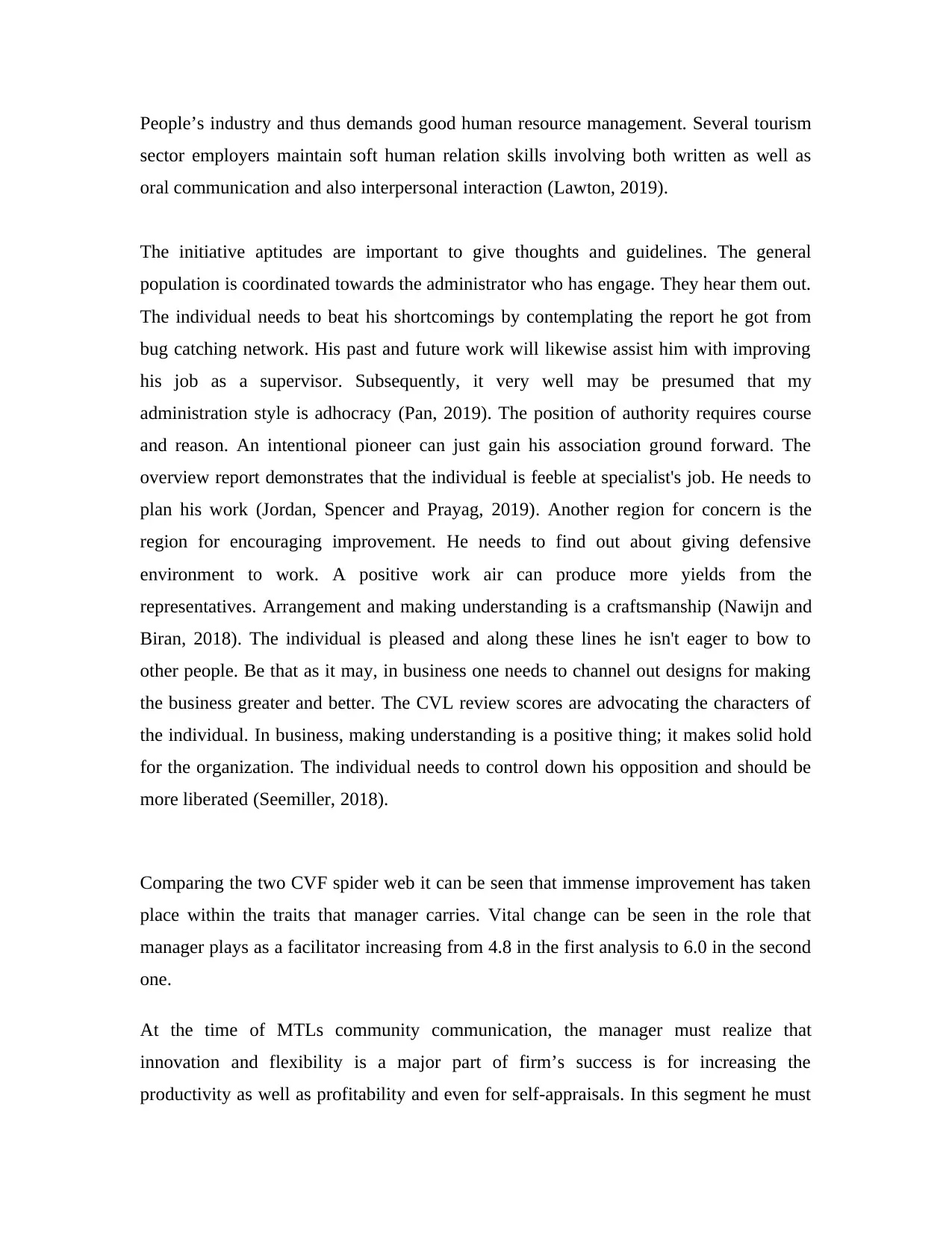
People’s industry and thus demands good human resource management. Several tourism
sector employers maintain soft human relation skills involving both written as well as
oral communication and also interpersonal interaction (Lawton, 2019).
The initiative aptitudes are important to give thoughts and guidelines. The general
population is coordinated towards the administrator who has engage. They hear them out.
The individual needs to beat his shortcomings by contemplating the report he got from
bug catching network. His past and future work will likewise assist him with improving
his job as a supervisor. Subsequently, it very well may be presumed that my
administration style is adhocracy (Pan, 2019). The position of authority requires course
and reason. An intentional pioneer can just gain his association ground forward. The
overview report demonstrates that the individual is feeble at specialist's job. He needs to
plan his work (Jordan, Spencer and Prayag, 2019). Another region for concern is the
region for encouraging improvement. He needs to find out about giving defensive
environment to work. A positive work air can produce more yields from the
representatives. Arrangement and making understanding is a craftsmanship (Nawijn and
Biran, 2018). The individual is pleased and along these lines he isn't eager to bow to
other people. Be that as it may, in business one needs to channel out designs for making
the business greater and better. The CVL review scores are advocating the characters of
the individual. In business, making understanding is a positive thing; it makes solid hold
for the organization. The individual needs to control down his opposition and should be
more liberated (Seemiller, 2018).
Comparing the two CVF spider web it can be seen that immense improvement has taken
place within the traits that manager carries. Vital change can be seen in the role that
manager plays as a facilitator increasing from 4.8 in the first analysis to 6.0 in the second
one.
At the time of MTLs community communication, the manager must realize that
innovation and flexibility is a major part of firm’s success is for increasing the
productivity as well as profitability and even for self-appraisals. In this segment he must
sector employers maintain soft human relation skills involving both written as well as
oral communication and also interpersonal interaction (Lawton, 2019).
The initiative aptitudes are important to give thoughts and guidelines. The general
population is coordinated towards the administrator who has engage. They hear them out.
The individual needs to beat his shortcomings by contemplating the report he got from
bug catching network. His past and future work will likewise assist him with improving
his job as a supervisor. Subsequently, it very well may be presumed that my
administration style is adhocracy (Pan, 2019). The position of authority requires course
and reason. An intentional pioneer can just gain his association ground forward. The
overview report demonstrates that the individual is feeble at specialist's job. He needs to
plan his work (Jordan, Spencer and Prayag, 2019). Another region for concern is the
region for encouraging improvement. He needs to find out about giving defensive
environment to work. A positive work air can produce more yields from the
representatives. Arrangement and making understanding is a craftsmanship (Nawijn and
Biran, 2018). The individual is pleased and along these lines he isn't eager to bow to
other people. Be that as it may, in business one needs to channel out designs for making
the business greater and better. The CVL review scores are advocating the characters of
the individual. In business, making understanding is a positive thing; it makes solid hold
for the organization. The individual needs to control down his opposition and should be
more liberated (Seemiller, 2018).
Comparing the two CVF spider web it can be seen that immense improvement has taken
place within the traits that manager carries. Vital change can be seen in the role that
manager plays as a facilitator increasing from 4.8 in the first analysis to 6.0 in the second
one.
At the time of MTLs community communication, the manager must realize that
innovation and flexibility is a major part of firm’s success is for increasing the
productivity as well as profitability and even for self-appraisals. In this segment he must
Paraphrase This Document
Need a fresh take? Get an instant paraphrase of this document with our AI Paraphraser
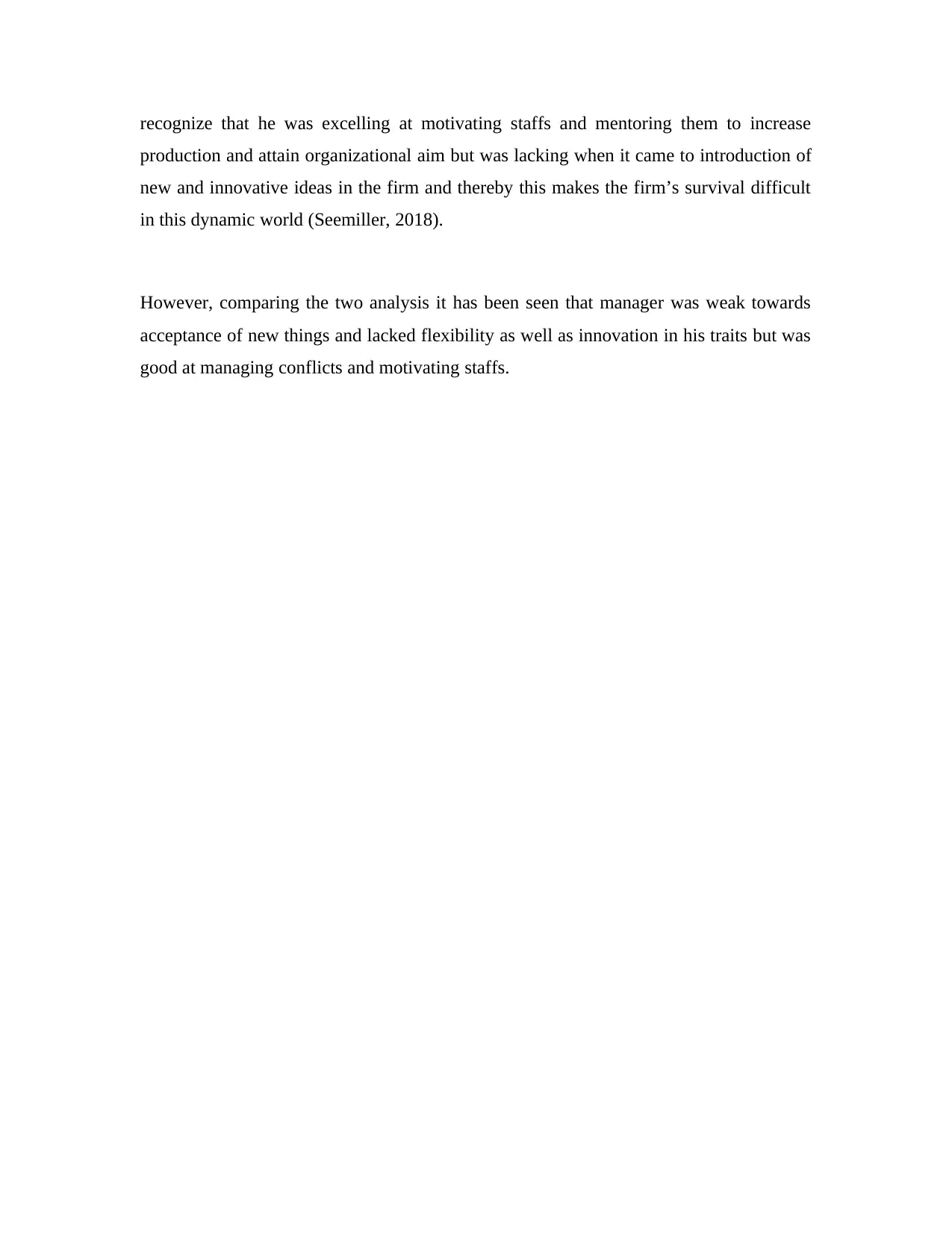
recognize that he was excelling at motivating staffs and mentoring them to increase
production and attain organizational aim but was lacking when it came to introduction of
new and innovative ideas in the firm and thereby this makes the firm’s survival difficult
in this dynamic world (Seemiller, 2018).
However, comparing the two analysis it has been seen that manager was weak towards
acceptance of new things and lacked flexibility as well as innovation in his traits but was
good at managing conflicts and motivating staffs.
production and attain organizational aim but was lacking when it came to introduction of
new and innovative ideas in the firm and thereby this makes the firm’s survival difficult
in this dynamic world (Seemiller, 2018).
However, comparing the two analysis it has been seen that manager was weak towards
acceptance of new things and lacked flexibility as well as innovation in his traits but was
good at managing conflicts and motivating staffs.
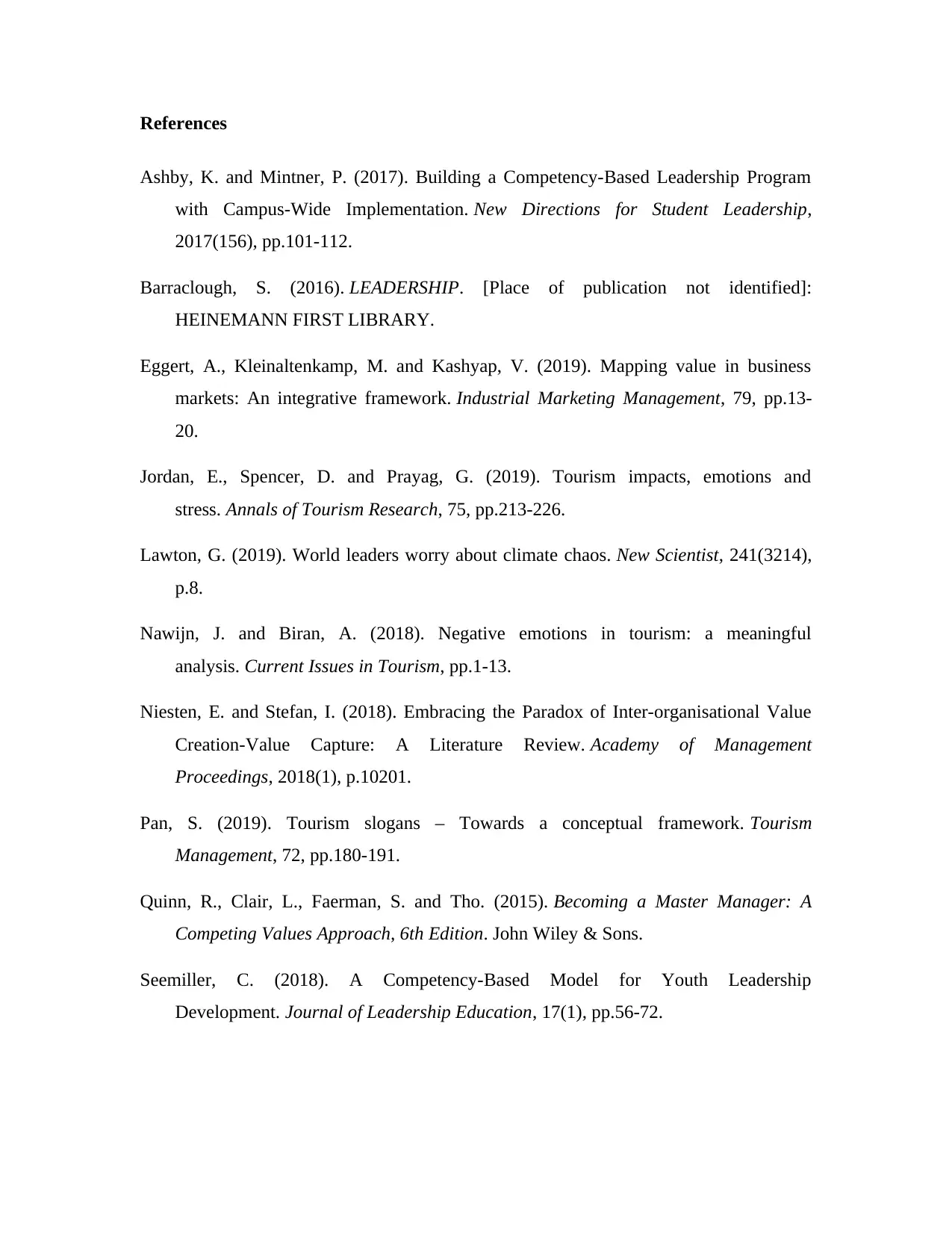
References
Ashby, K. and Mintner, P. (2017). Building a Competency-Based Leadership Program
with Campus-Wide Implementation. New Directions for Student Leadership,
2017(156), pp.101-112.
Barraclough, S. (2016). LEADERSHIP. [Place of publication not identified]:
HEINEMANN FIRST LIBRARY.
Eggert, A., Kleinaltenkamp, M. and Kashyap, V. (2019). Mapping value in business
markets: An integrative framework. Industrial Marketing Management, 79, pp.13-
20.
Jordan, E., Spencer, D. and Prayag, G. (2019). Tourism impacts, emotions and
stress. Annals of Tourism Research, 75, pp.213-226.
Lawton, G. (2019). World leaders worry about climate chaos. New Scientist, 241(3214),
p.8.
Nawijn, J. and Biran, A. (2018). Negative emotions in tourism: a meaningful
analysis. Current Issues in Tourism, pp.1-13.
Niesten, E. and Stefan, I. (2018). Embracing the Paradox of Inter-organisational Value
Creation-Value Capture: A Literature Review. Academy of Management
Proceedings, 2018(1), p.10201.
Pan, S. (2019). Tourism slogans – Towards a conceptual framework. Tourism
Management, 72, pp.180-191.
Quinn, R., Clair, L., Faerman, S. and Tho. (2015). Becoming a Master Manager: A
Competing Values Approach, 6th Edition. John Wiley & Sons.
Seemiller, C. (2018). A Competency-Based Model for Youth Leadership
Development. Journal of Leadership Education, 17(1), pp.56-72.
Ashby, K. and Mintner, P. (2017). Building a Competency-Based Leadership Program
with Campus-Wide Implementation. New Directions for Student Leadership,
2017(156), pp.101-112.
Barraclough, S. (2016). LEADERSHIP. [Place of publication not identified]:
HEINEMANN FIRST LIBRARY.
Eggert, A., Kleinaltenkamp, M. and Kashyap, V. (2019). Mapping value in business
markets: An integrative framework. Industrial Marketing Management, 79, pp.13-
20.
Jordan, E., Spencer, D. and Prayag, G. (2019). Tourism impacts, emotions and
stress. Annals of Tourism Research, 75, pp.213-226.
Lawton, G. (2019). World leaders worry about climate chaos. New Scientist, 241(3214),
p.8.
Nawijn, J. and Biran, A. (2018). Negative emotions in tourism: a meaningful
analysis. Current Issues in Tourism, pp.1-13.
Niesten, E. and Stefan, I. (2018). Embracing the Paradox of Inter-organisational Value
Creation-Value Capture: A Literature Review. Academy of Management
Proceedings, 2018(1), p.10201.
Pan, S. (2019). Tourism slogans – Towards a conceptual framework. Tourism
Management, 72, pp.180-191.
Quinn, R., Clair, L., Faerman, S. and Tho. (2015). Becoming a Master Manager: A
Competing Values Approach, 6th Edition. John Wiley & Sons.
Seemiller, C. (2018). A Competency-Based Model for Youth Leadership
Development. Journal of Leadership Education, 17(1), pp.56-72.
⊘ This is a preview!⊘
Do you want full access?
Subscribe today to unlock all pages.

Trusted by 1+ million students worldwide
1 out of 6
Related Documents
Your All-in-One AI-Powered Toolkit for Academic Success.
+13062052269
info@desklib.com
Available 24*7 on WhatsApp / Email
![[object Object]](/_next/static/media/star-bottom.7253800d.svg)
Unlock your academic potential
Copyright © 2020–2026 A2Z Services. All Rights Reserved. Developed and managed by ZUCOL.




